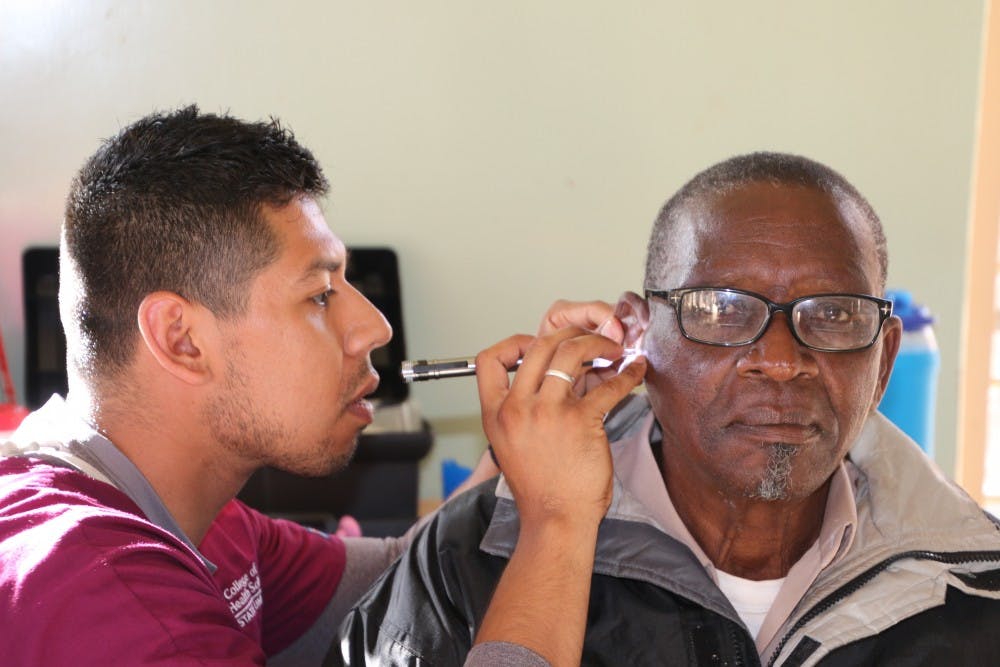Hearing for Humanity, an ASU program under the ASU Foundation that focuses on providing humanitarian audiological aid, will hold a fundraiser on Sunday at Postino Annex for their annual trip to Malawi, Africa.
Proceeds from the fundraiser will go toward audiological care among the Malawi community, training local clinicians and supporting the undergraduate and graduate students in the ASU Department of Speech and Hearing Science who are using the study abroad opportunity to gain experience.
Ingrid McBride, a clinical professor and director of the Audiology Clinic at ASU, said she founded the program at ASU after seeing a need for hearing and ear care service in developing countries.
“Back in 2010, there were no audiologists in Malawi,” she said. “They just lack the human resources to be able to provide any type of services like that.”
McBride said she took her first small group of students to Malawi in 2010, and it has expanded due to the efforts of students and other organizations dedicated to sensory assistance, including EARS Inc. and Sound Seekers.
“When we go, we work very closely with these in-country partners, which is essential because it is necessary to have appropriate sustainability,” she said.
McBride said one of her former students, Dr. Courtney Caron, said decided to make humanitarian audiology her career after taking several trips with Hearing for Humanity.
“On that third trip she stayed behind," she said. “She has built a clinic in the southern part of Malawi.”
McBride said the program allows students to gain experience in a setting unlike that of their own clinic.
“As far as what we get out of it — of course, besides the tremendous opportunity to participate — is that the students are really exposed to things that they would not see typically in a developed county like the U.S.,” she said. “It’s a great experience for them — a cultural experience.”
McBride also said Hearing for Humanity and their in-country partners have helped the people of Malawi move in a direction of self-sustainability and growth, which is the overall goal of the project.
“Now, not only are there those two wonderful audiology clinics that would rival any clinic in the U.S., but there’s actually Malawian students who have been studying audiology,” she said. “Eventually they won’t need any outside assistance because they will have developed their own talent and structure to provide these services on their own.”
Students fundraise for their own travel and living expenses of the trip, but McBride said the whole program fundraises for the supplies and equipment they will need to assist patients.
“We test at least a couple thousand people while we’re there, we fit more than 500 hearing aids while we’re there,” she said. “We need to fundraise to be able to replenish that for the next trip.”
McBride said this program has not only allowed her to use her specialties to help others, but also has given her insight into another culture.
“It’s allowed me to see that one does not need money and fancy cars and lots of possessions in order to be happy,” she said. “Malawi is known as the warm heart of Africa, and that certainly has been our experience with everyone we have met there."
Elizabeth Diamond, a first-year graduate student studying audiology, said going on the trip this year will affect her both personally and professionally.
“I’ve never been out of the U.S., so traveling to another country is going to be a new experience for me,” she said. “Professionally, just being in a clinic where there’s not a set schedule, having a different role every day and kind of just rolling with the punches to get everything done will be really interesting.”
Diamond said she has heard the success stories of other second- or third-year students who went to Malawi in the past.
“A lot of them had a specific story of how they remember one day this person came in, they were able to fit them, and you were able to see it on their face that this opened so many doors for them.” she said. “A lot of them talked about having lines down the street of people lined up to come into the clinic.”
Rochelle Wong, also a first-year graduate student in audiology, said she hopes to further grow her own skills in audiology while learning from the culture around her.
“We don’t really want to make an impact of our culture, more so just of our knowledge about audiology and speech,” she said. “As for us, I think we’ll have an appreciation for what we have here and for being adaptable in terms of communication to our patients.”
Wong said it’s important to raise money for the program to keep providing services to those in need, and people can see the dedication of these students by coming to fundraisers like the upcoming one at Postino Annex.
“It’s really important to put a face to the event,” she said. “To see the students outside of the clinic and see how they are really pushing creates connection.”
Reach the reporter at kasando1@asu.edu or follow @karismasandoval on Twitter.
Like The State Press on Facebook and follow @statepress on Twitter.




